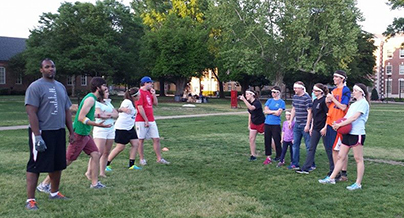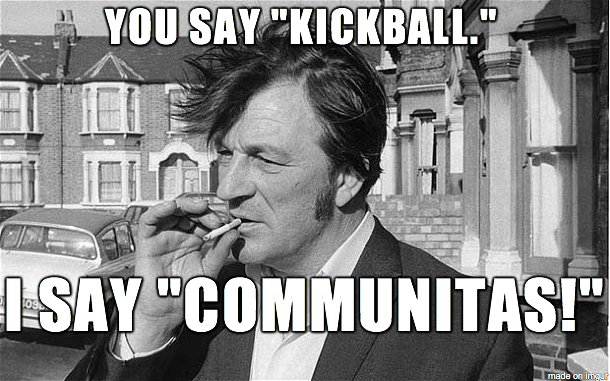Why do we teach our students social theory? Why teach them about collective effervescence, habitus, and discourse? I think we do it because we find these theories to be useful tools for analyzing and explaining the world around us. But often, I think, we academics are wont to apply these same theories to our more intimate surroundings. Theory is often a tool for explaining that stuff out there and rarely do we see it as a tool that we can put to use nearby. We don’t often praxis what we preach.
This is why I am so proud of our Manly Cup tradition here in our department. This year’s kickball game was my first Manly Cup and it lived up to all my expectations. But as the game progressed I was struck by how much this kickball game reminded me of Victor Turner. Turner is probably most famous for his theory of liminality and communitas. Liminality referred to a phase Turner saw in rituals such as rites of passage or pilgrimage in which a person found themselves in transition from one stage to another. As he put it:
Liminal entities are neither here nor there; they are betwixt and between the positions assigned and arrayed by law, custom, convention, and ceremonial.
The liminal is “a ‘moment in and out of time’ and in and out of secular social structure” and it reveals a recognition of “a generalized social bond that has ceased to be and has simultaneously yet to be fragmented into a multiplicity of social structural ties.” Liminality is radically egalitarian. The usual social structures that separate individuals and groups are destroyed. Everyone involved is in the same place, betwixt and between their former identities and their soon-to-be ones.
This is what happened during our kickball game. Students and professors usually interact in very defined spaces and in very defined ways. Us professors lecture or lead discussions in assigned classrooms at assigned times. Students attend (usually). They may ask questions, they hopefully complete assignments, and they may occasionally stop by office hours in another assigned space during another allotted time. But last week on the quad, students and faculty worked together to literally build a new social space. We laid out bases and a pitchers mound. We split into teams, even trading one professor (yours truly) to the student team. And, most importantly, we interacted in ways completely outside our usual “law, custom, convention, and ceremonial,” to use Turner’s language. The kickball field was a liminal space betwixt and between the world outside school and the world of the classroom. The game itself was a liminal rite. I had this thought as I watched one student block a professors path to first base. It was an excellent box-out technique. But in that moment it was not a student boxing out a professor. It was one player boxing out another. That near-tackle along the first base line was only possible within the liminal space we had built.

Liminality produces something Turner called “communitas.” As Turner argued, communitas was integral to the maintenance of society.
It is rather a matter of giving recognition to an essential and generic human bond, without which there could be no society. Liminality implies the high could not be high unless the low existed, and he who is high must experience what it is like to be low.
The communitas of the liminal space or period holds the society together. It provides a relief from the social structures that oppress, constrain, and limit. It reminds everyone that, though they exist in separate places of the social structures, they all share in the same society. But most importantly, the communitas actually strengthens the social structures when they return on the other side of the liminal. When social actors leave the liminal and return to the social structures, those structures are now bearable.
As we walked from the quad back to Manly Hall, I heard a student ask a professor, “Have you gotten a chance to grade my essay yet?” The liminality was fading with the sun as we walked back toward the building with classrooms and offices and away from the open space of the quad. But perhaps exam week will be more bearable for us all after our liminal experience together. Perhaps the communitas will carry us through.
